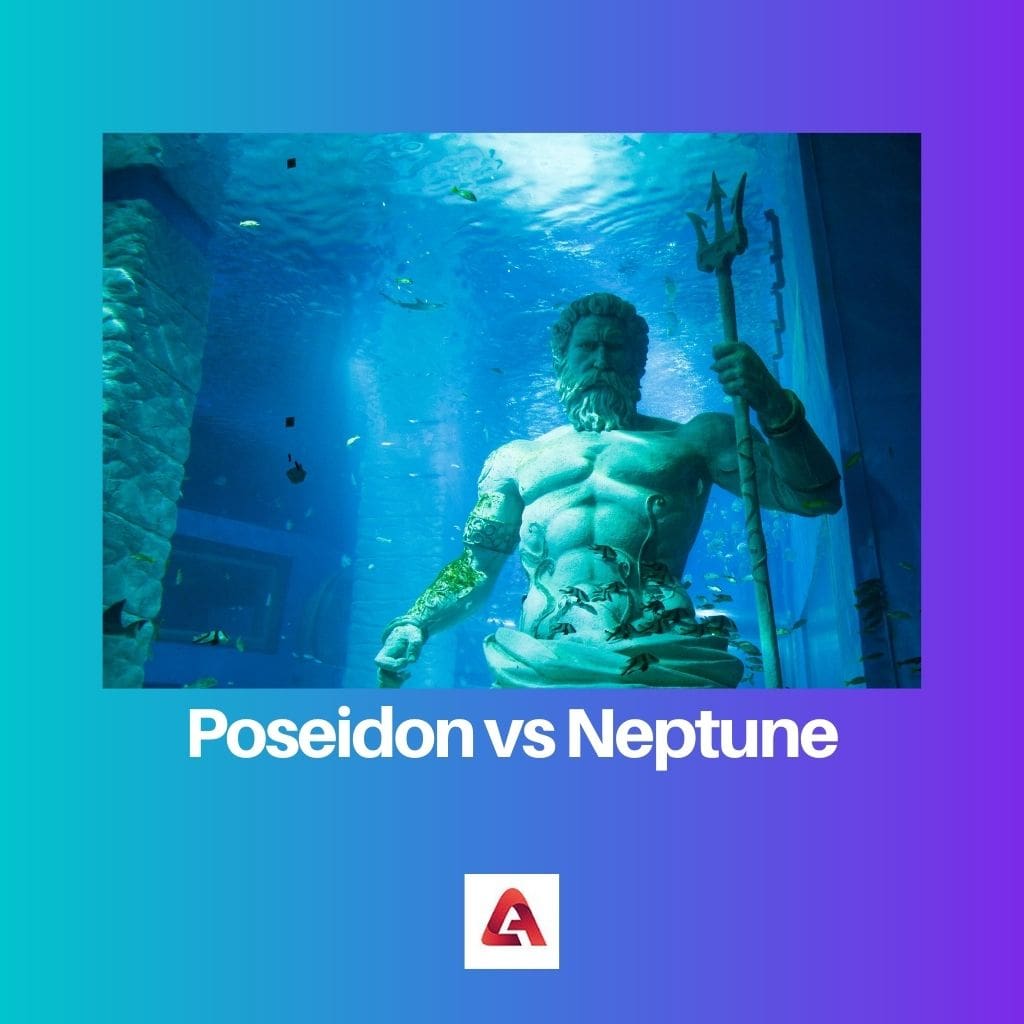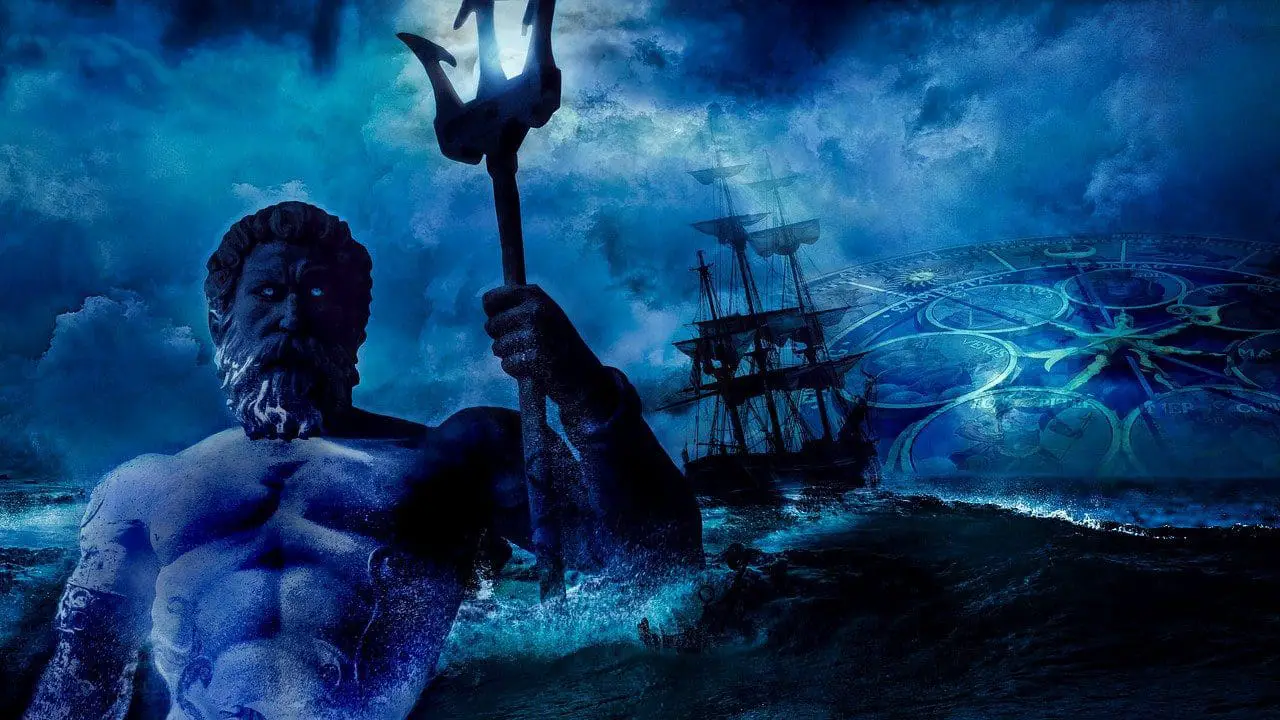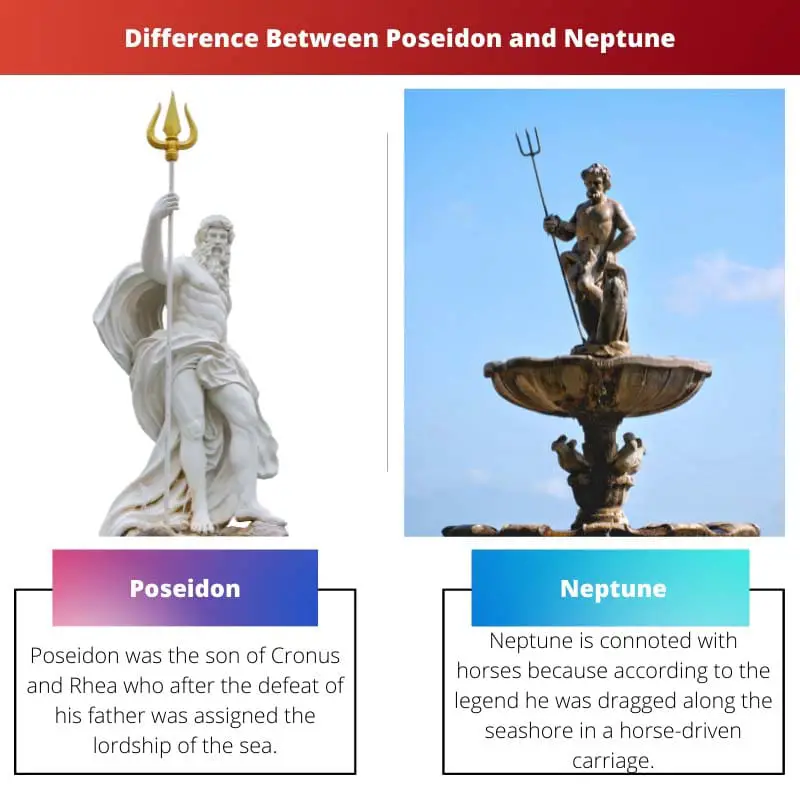Greek mythology and Roman mythology have always impacted our existing knowledge greatly. Whether it is their writings and principles or lifestyle, they are believed to significantly influence what we are today.
If you believe in the revival of history, you cannot help but go through the pages of Roman and Greek origin. Gods of either mythology are still taken care of in contemporary writings.
Today we will understand and differentiate between two of the most excellent Gods of the Roman and Greek culture: Neptune, the God of freshwater, and Poseidon, the great God of the sea.
Key Takeaways
- Poseidon is the ancient Greek god of the sea, earthquakes, and horses and is a major deity in Greek mythology, depicted wielding a trident.
- Neptune is the ancient Roman god of the sea, equivalent to Poseidon in Greek mythology, and is also associated with water, storms, and horses.
- Although Poseidon and Neptune have similar roles and attributes as gods of the sea in their respective mythologies, Poseidon is part of Greek mythology, while Neptune belongs to Roman mythology.
Poseidon vs Neptune
Poseidon is part of Greek mythology as the son of Cronus, also the God of water and the sea, and he is represented with a mighty trident. Neptune is part of Roman mythology, where he is termed the God of fresh water, and he is represented by a dolphin, seahorses, and a mighty trident.

Even though the two appear strikingly similar features in sculptures, their history and origin separate them. They belong to two unique cultures.
Although the two Gods might seem to rule the sea, there is a giant difference in their rule, origin, culture, and stories. They have their history, to begin with, and no way the separate histories can collide and merge to be one.
Neptune is the Roman God of freshwater, and Poseidon is the Greek God of the sea and in no way are these two Gods the same. It is a myth heard that Romans adopted the great God of the sea, Poseidon, and very feasibly renamed him Neptune.
However, this isn’t true at all! Even though Poseidon and Neptune look almost the same, a gigantic history separates them, originating from their respective geographical land.
Comparison Table
| Parameters of Comparison | Neptune | Poseidon |
|---|---|---|
| Origin | Neptune (Latin – Neptunus) is a God in Roman mythology. | Poseidon is a God in Greek mythology. |
| Story | According to the legend, Neptune is connoted with horses because he was dragged along the seashore in a horse-driven carriage. | Poseidon was the son of Cronus and Rhea, who, after his father’s defeat, was assigned the lordship of the sea. |
| Way of Worshipping | In Greek culture, Neptune is celebrated in this festival called “Neptunalia”, named after the God himself. | In ancient Greece, a festival called Isthmian Games was known for its elaborate athletic and musical display. This festival was primarily celebrated in the name of Poseidon. |
| Appearance | In Roman culture, Neptune is primarily represented with a trident and a dolphin. Sometimes, seahorses too. | In Greek culture, Poseidon is represented with a trident only. He is not accompanied by dolphins or other sea animals, for that matter. |
| Representation | It is considered to be the God of freshwater. | He is considered to be the God of the sea. |
Who was Neptune?
In Roman mythology, Neptune (Latin – Neptunus) is the God of fresh water. He is represented with a trident and a dolphin, sometimes even seen riding seahorses in various pictures and sculptures.
Neptune’s name in Latin stands for “moist” or wet. Neptune is sometimes connoted with horses because, according to the legend, he was dragged along the seashore in a horse-driven carriage.
In Greek culture, Neptune is celebrated in this festival called “Neptunalia”, named after the God himself. The festival was orchestrated in the middle of summer, on the 23rd of July, when Greece was struck with water scarcity.
Since Neptune is believed to be the God of freshwater, the deity was appealed to and invocated for the crisis. Neptune is also believed to have a temple in his name in Rome called Circus Flaminius.
The temple is adorned with beautifully crafted sculptures, with Neptune and Thetis leading a group of water deities.

Who was Poseidon?
Poseidon is the Greek God of the sea. He was the son of the Greek Gods Cronus and Rhea, who, after his father’s defeat, was assigned the responsibility of the sea while his brother Zeus and Hades were given the sky and the underworld, respectively.
Poseidon is also represented with a trident in his arm raised towards the skies. But he is not accompanied by sea animals in any picture.
He is called the messiah of seafarers and voyagers, punishing those severely found guilty with storms and earthquakes. He is famous for the wrath he expresses.
Also known by the name of “earth-shaker” in various cults. In ancient Greece, a festival called Isthmian Games was known for its elaborate athletic and musical display.
This festival was primarily celebrated in the name of Poseidon.
| # | Preview | Product | |
|---|---|---|---|
| 1 |

|
Veronese Design Poseidon God of The Sea Miniature Figurine | Check Price on Amazon |
| 2 |
![Poseidon [Blu-ray]](https://m.media-amazon.com/images/I/61qAuctoqBL._SL160_.jpg)
|
Poseidon [Blu-ray] | Check Price on Amazon |

Main Differences Between Poseidon and Neptune
- Poseidon is a God belonging to Greek mythology, while Neptune belongs to Roman mythology.
- Poseidon is the God of the sea, while Neptune is the God of fresh water.
- Neptune is represented by dolphins and seahorses, sometimes even seen leading the water Gods along with Thetis. Poseidon is represented solely by holding a trident raised to the skies above.
- Neptune is celebrated through the famous festival called Neptunalia. Poseidon is celebrated in Greece in a festival called Isthmian Games.
- Neptune is also sometimes connoted with horses because, according to the legend, he was dragged along the seashore in a horse-driven carriage. At the same time, Poseidon was the son of Cronus and Rhea, who, after his father’s defeat, was assigned the lordship of the sea, while his brother Zeus and Hades were given the sky and the underworld, respectively.

- https://core.ac.uk/download/pdf/29373570.pdf#page=45
- https://journals.sagepub.com/doi/abs/10.1177/0020852313489947
Last Updated : 13 July, 2023

Chara Yadav holds MBA in Finance. Her goal is to simplify finance-related topics. She has worked in finance for about 25 years. She has held multiple finance and banking classes for business schools and communities. Read more at her bio page.



The post’s layout and organization made it incredibly easy to follow and comprehend. Well done!
Agreed, it’s very clear and concise.
The post definitely presents the information in a very accessible way.
I appreciate the detailed breakdown of the differences in worship, appearance, and representation between Neptune and Poseidon. Very well explained.
Actually, the explanation made it quite easy to distinguish the two deities.
I agree, it’s great to have all of this information in one place.
This post is so informative! I never knew that there were so many differences between Neptune and Poseidon. They were so similar, but their history and origin separate them completely.
I thought they were the same god as well. It’s fascinating to learn the distinctions between them.
The comparison table is really helpful for understanding the differences at a glance.
I always enjoy learning more about mythology and this post did not disappoint. So interesting to see how the myths differ between cultures.
The depth of information here is incredible. Almost like a crash course in mythology.
It’s amazing the impact that Roman and Greek mythology still have on us today.
This was a great read! I had been looking for a comprehensive breakdown of Neptune and Poseidon and this certainly delivered.
This post truly captures the essence of these mythological figures in a concise and easy-to-understand manner.
I completely agree, I feel like I have a much better understanding of Neptune and Poseidon now.
It’s incredible to see how the worship and festivals of Neptune and Poseidon differed, even though they were both associated with water.
I had the same thought. The cultural variations are quite striking.
The story behind the name Neptune is quite fascinating. I had no idea about the festival Neptunalia.
Yes, I found the festival and its purpose very interesting too.
I never realized the depth of the differences between Neptune and Poseidon before reading this post. Very enlightening.
The details provided really paint a vivid picture of the distinctions between the two mythological figures.
I found the comparison table to be very helpful in understanding the nuances between Neptune and Poseidon.
The clear categorization of differences makes it easier to grasp the key points.
Yes, it’s great to see the details laid out in such a clear way.